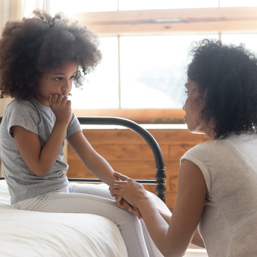-
Written by Bobbi Jo Gaetz
The weather is getting warmer and the snow is melting, bringing thoughts of spring and summer to mind. As we get excited for the snow to melt and leaves to sprout, it is the season for parents to begin to peruse the options of summer camps, especially now that they may be back at work in the workplace rather than at home. Since summer camps have not been as available for the past two summers, children may be more reluctant to leave home and try new experiences.
Here are some ideas to help children who are struggling with anxiety be successful with summer camps:
- Choice. Involve your child when choosing which camps to attend. If your child is reluctant to choose a camp at all, then state that it is necessary (due to childcare, exposure to experiences, etc.) and provide two choices you think they would enjoy (based on their temperament and strengths, not their siblings) to choose between. Find out about as much as possible regarding the camp, such as the environment, activities, etc. If it is an overnight camp, find out about the sleeping arrangements, etc., in as much detail as possible.
- Listen. When your child brings up their feelings about going to a summer camp, listen. Validate how they are feeling by saying, “I know it can seem scary to go to a new place with new people.” Even if you do not feel your children should be feeling afraid or scared, listen and validate their feelings anyway. Do not say, “don’t worry. You have nothing to be scared of.”
- Ask what they are afraid of. It is important for the child to have the opportunity to identify and express what they are scared of. It might be that they will not know anyone, they are not feeling confident in the activities, or they had a negative experience in the past. When they talk about their fears, let them just list them rather than trying to talk them out of those fears. You can say, “okay, since you are not feeling good about going to camp, let’s name all those fears. What are you worried about?” or “how are you feeling about going swimming?” Once again, this is a time to listen, even if you disagree. If your child is afraid of a specific activity, try to practice that before the camp. For example, take them swimming, on bike rides, and, if possible, take them for this activity where the camp will be to build their confidence.
- Ask about the good things. After the child has shared their fears, ask them, “I wonder what the good things about camp would be. What are the good things?” The child may need some assistance, so you can prompt them by asking questions. You might tell some personal stories about your summer camp experiences.
- Worst case scenario. Some children picture the worst thing that could possibly happen, so it can be helpful to talk this through. Ask your child the “what if” questions. “What if that happened? What could you do? How could you handle that?” Often, they realize that there is almost no chance of that happening, or if it does, they now have a plan to handle it.
- Manage your own anxiety. Often parents are anxious about their children going to summer camp, especially overnight camps. Whether the camp is a partial day, full-day, or longer, it is important to express confidence in your child. Talk about being “brave,” which means being scared and doing it anyway. Keep your concerns to yourself.
- Short goodbyes. Keep goodbyes short. The longer you stay, the harder it will be for your child to leave you. Just like when kids go to school for the first time, they may be very upset when you say goodbye, but then they recover once you leave, and they get busy. If you stay, hoping they settle, it sends the message that they may be able to leave with you. Instead, say goodbye with a kiss or hug and a smile, turn and leave. If you become upset, then they won’t see it. (We have probably all had a cry in the car!)
- Something personal. If your child is struggling to leave you, provide them with something to keep with them at camp (in their pocket or backpack). This could be a bracelet you made together or that you have matching ones, a small picture of you, or some other sentimental item. If they are going overnight, have them pack a comfort item (like a stuffie) or include little notes.
A couple of books that can be useful when children must be away from a parent include:
The Kissing Hand by Audrey Penn
The Invisible String by Patrice Karst
Additionally, you may want to practice relaxation exercises with your child before they go to camp, such as using a relaxation app or reading children’s books on breathing techniques, etc. If these strategies are not enough and your child is having significant anxiety at the thought of going to camp and/or leaving you, seek the help of a professional. A psychologist can offer a consultation to provide additional strategies to address your child’s particular fears or issues.
Bobbi is a registered psychologist with over 20 years of experience with children, youth, and parents. Visit her private practice website at discoverypsych.ca for additional blog posts and information on services for children and parents.
